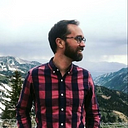“You don’t have to believe anything that isn’t true.”
An ideal for Mormons to live up to, from Henry Eyring’s father

It was the fall of 1919, and Henry Eyring was set to start school at the University of Arizona. Before he left, he spent one last day hauling hay with his father, who offered him some advice about education and his Mormon religion.
His father said, “In this Church you don’t have to believe anything that isn’t true.” Then he added, “You go over to the University of Arizona and learn everything you can, and whatever is true is a part of the gospel.”
Henry Eyring later said that this advice guided him during his career as a scientist, which was about as successful as a career can be — with more than 600 articles, 10 scientific books, and a wide range of national awards to his name, including the National Medal of Science, bestowed by Lyndon B. Johnson.
Disagreeing with Church Leaders
The advice also guided Henry Eyring when he disagreed with Church leaders, which he occasionally did.
For instance, in 1954 when Joseph Fielding Smith published Man, His Origin and Destiny (a book that took an anti-evolutionary worldview), Eyring wasn’t afraid to disagree with the book even though Smith was the president of the Quorum of the Twelve Apostles at the time.
In a letter to a friend, Henry Eyring echoed the words of his father and used considerable tact. He wrote, “Since the gospel is only that which is true, this book cannot be regarded as more than the private opinion of one of our great men to be admired for the fine things in it.”
When Smith confronted Eyring directly about the book, Eyring didn’t budge. He wrote, “In my judgment there is room in the Church for people who think that the periods of creation were a) 24 hours, b) 1000 years, or c) millions of years.”
Then he added a line that if internalized, would go a long way in healing conflicted relationships around the world. He wrote, “Since we agree on so many things, I trust we can amicably disagree on a few.”
It’s clear that Henry Eyring deeply internalized his father’s advice:
You don’t have to believe anything that isn’t true.
Who Says What Is True?
If we take Henry Eyring’s father at his word and only believe that which is true, how do we know who to believe? How do we know what is true and what isn’t?
Henry Eyring shows us a good model.
First, he promoted open discussion. In the same letter to Joseph Fielding Smith he wrote, “I think it is fine to discuss these questions and for each individual to try to convert the other to what he thinks is right.” In other words, go ahead and use reasoning to persuade me. There’s nothing wrong with that.
Second, he trusted consensus from experts in their various fields. The reason Henry Eyring wouldn’t budge when it came to the theory of evolution was because he’d seen the corroborating evidence supporting the theory. Had Eyring not been a scientist himself, he might not have believed it. But he was, and he did.
Third, he trusted his ability to listen to a variety of viewpoints and choose the views that aligned most closely with the truth—regardless of whether those views came from his religious community or elsewhere. Truth was truth no matter where it came from, even if it meant that traditional religious views on topics like evolution were mistaken.
In short, Henry Eyring listened openly, considered the evidence, and then revised his worldview.
What If People Lose Faith?
Some people might disregard Henry Eyring’s approach to truth finding because they worry that doing so will lead them to apostasy. What if pursuing the truth leads you away from religious belief? Should you pursue the truth anyway?
Henry Eyring took the position that because truth is worth pursuing as an end in itself, we should never shy away from it. When a religious leader asked him whether Mormon schools such as BYU should discourage doctorate degrees because they might lead students to lose their faith, Henry Eyring came down clearly in favor of higher education.
He wrote, “Some people drift [from Mormonism] when they study, but some people drift when they don’t study. If the Church espouses the cause of ignorance it will alienate more people than if it advises them to seek after the truth even at some risk.”
In the end, this is the only attitude that can withstand the test of time. It mirrors the words of John Milton, who argued that we should “let [truth] and falsehood grapple” and then asked, “who ever knew truth put to the worse in a free and open encounter?”
That is, to find the truth we must readily expose ourselves to the best arguments on each topic and then be prepared to do the hard work of changing our minds.
For me, this attitude is the great legacy of Henry Eyring. It’s a legacy that all organizations, including Mormonism, should embrace emphatically today.
